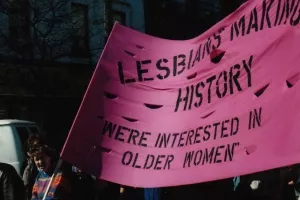
Audio files: LGBTQ+ oral histories live on in new digital archive
Academics, writers, artists and playwrights searching for first-person accounts from the gay, lesbian, queer and trans community will soon be able to access that information digitally, thanks to an ambitious project headed by U of T Mississauga history professor Elspeth Brown.
Brown, an associate professor at UTM, is director of The LGBTQ Oral History Digital Collaboratory, a multi-year research project that will create the largest collection of LGBTQ+ oral histories in North America.
Known as the Collaboratory, the project explores “the histories of trans people, queer women, gay men and lesbians in the U.S. and Canada through the creation of a virtual research meeting place.” Based at U of T, the project is partnered with Toronto’s Canadian Lesbian and Gay Archives, University of Toronto Libraries and a several community-based archives across North America. Over five years, the Collaboratory will digitize and transcribe existing oral history collections, and create new collections of trans-related materials. It will also develop a digital “oral history hub” of resources, along with a library guide to aid research in the CLGA’s large collection of trans history materials.
“Oral histories are important because they speak to people about their own lives and the past,” Brown says. “They are a great resource when other historical records don’t represent the questions you want to answer, or the topic you’re hoping to explore.”
The first installment of the Collaboratory project launched in June with a collection of newly digitized and transcribed interviews that were previously inaccessible. The Lesbians Making History Collection features decades-old interviews conducted by U of T sexual diversity studies professor (now emeritus) Maureen FitzGerald and community activist Amy Gottlieb, who interviewed eight lesbian women about their experiences from the 1940s through to the 1970s. Recorded on cassette tapes, the interviews cover personal stories and larger cultural events, such as 1960s-era feminism. All but one of the eight interview subjects has since died. The Collaboratory will also digitize and transcribe a second oral history collection. The Foolscap Oral History Project is a series of 1980s interviews by and with gay men, covering drag and bar scenes, as well as early political activism.
“These interviews are pre-digital and previously unprocessed. The collection is an absolute goldmine,” Brown says, adding that she is thrilled that the materials will finally be accessible to researchers. Often, historic materials are spread across various research or private collections, and aren’t readily accessible, she says. “Digitizing and transcribing are an expensive process and, because of the content and the people involved, gay and lesbian archives have not always been warmly welcomed by state or university archives. Community groups have traditionally managed these archives, but universities are now more willing and interested in collaborating with community-based gay and lesbian archives.”
The Collaboratory project digitized and transcribed the recordings, which are part of the CLGA collection. The result is a collection that is now searchable and accessible through a site co-hosted by the University of Toronto Libraries and the CLGA. The hope, Brown says, is that this will become a formal and long-term partnership. “We’re working together to figure out how we can create a system that will preserve these digital objects long-term,” Brown says. “There’s a real interest in history and the folks who lived through those times. People want to be connected to that past and those histories.”
Trans history is another important branch of the project. The Collaboratory is currently developing the Trans Partner Oral History Project, for which Brown has interviewed more than 50 partners of trans men about their experiences living with a partner who has or is in the process of transitioning from female to male. A member of the Collaboratory at the University of Victoria is developing the Trans History Oral History Project, which focuses on the life histories and papers of senior trans activists.
“The history of trans experience has really been overwritten by medical and social representations about trans lives,” Brown says. “But oral history is a really rich resource—it helps you understand how people represent their own narratives.”
The Collaboratory, which launched in 2014, is supported by a five-year $254,171 grant from the Social Sciences and Humanities Research Council of Canada.
Visit The LGBTQ Oral History Digital Collaboratory website (still under development) >
Hear an archival audio clip from Lesbians Making History >
Hear Elspeth Brown interviewed by CBC Radio's Metro Morning program >
